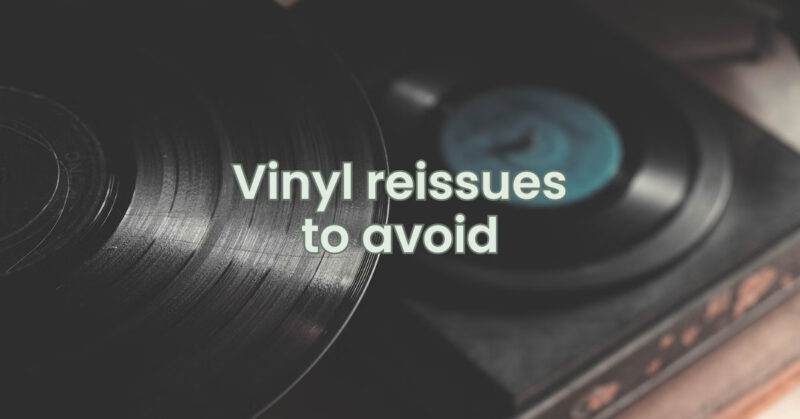Vinyl records have experienced a resurgence in popularity in recent years, with many artists and labels releasing reissues of classic albums. While vinyl reissues can offer an opportunity to own beloved music on a timeless format, it’s important to approach them with caution. Not all reissues are created equal, and some may fall short in terms of audio quality, mastering, or overall value. In this article, we will provide a guide to help discerning collectors identify vinyl reissues that may be worth avoiding, enabling you to make informed purchasing decisions.
- Lack of Information:
Reissues that lack detailed information about the mastering process, source material, or any remastering efforts should be approached with caution. Transparency is crucial, and reputable labels typically provide comprehensive information about the reissue process. Without this information, it’s challenging to assess the quality and authenticity of the vinyl release.
- Poor Mastering and Sound Quality:
One of the most significant concerns with vinyl reissues is poor mastering and sound quality. Some reissues are sourced from low-quality digital files or poorly executed remastering processes, resulting in subpar sound reproduction. Look for reissues that prioritize high-quality audio sources and well-executed mastering techniques to ensure an enjoyable listening experience.
- Excessive Use of Digital Processing:
Vinyl is beloved for its warm and organic sound, which can be compromised if excessive digital processing is applied during the mastering process. Overuse of digital processing techniques like dynamic range compression or excessive noise reduction can negatively impact the audio fidelity and the overall listening experience. Seek reissues that maintain the integrity and authenticity of the original recording.
- Non-Authorized Reissues:
Be cautious of reissues that are not authorized by the original artists or their estates. These unauthorized releases may lack proper licensing or quality control, potentially resulting in inferior sound quality or poor packaging. Support artists and labels who maintain the rights to the music and prioritize quality in their reissues.
- Packaging and Presentation:
Vinyl reissues should be treated as a complete package, encompassing not only the audio quality but also the overall presentation. Be wary of reissues with flimsy or low-quality packaging, generic artwork, or lack of attention to detail. A well-crafted reissue should pay homage to the original release with attention to packaging, liner notes, and artwork.
- Reissues from Dubious Sources:
Avoid reissues sourced from questionable origins, such as low-resolution digital files or unauthorized vinyl stampers. Reputable labels use high-quality source materials and collaborate with experienced mastering engineers to ensure the fidelity of the reissued albums. Research the label and their track record for quality reissues to make an informed decision.
Conclusion:
While vinyl reissues offer an opportunity to enjoy classic albums on a beloved format, not all reissues are created equal. By approaching vinyl reissues with caution, you can avoid potential disappointments and invest in releases that prioritize audio quality, mastering techniques, and overall value. Look for detailed information, reputable labels, well-executed mastering, and attention to packaging and presentation. Supporting artists and labels committed to delivering high-quality reissues will not only enhance your listening experience but also contribute to the longevity and integrity of the vinyl format. Remember, being an informed collector ensures that your vinyl collection represents the best in audio fidelity and enduring musical enjoyment.


